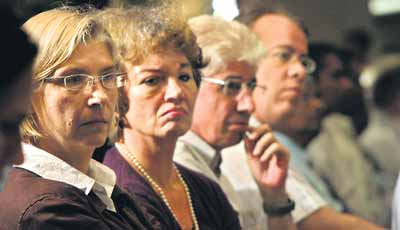
Prolonged war taking toll on economy – RanilThe ballroom was an appropriate setting as Opposition Leader Ranil Wickremesinghe earlier this week waltzed through a speech on "Maintaining the balance of peace building and economic development: the way forward".
He emphasised that the national problem is a political one that cannot be solved militarily. A long term solution has to necessarily address political aspirations, and be based on power sharing and devolution of power. Speaking at the ‘Business for Peace Initiative’ forum organized by the Federation of Chambers of Commerce and Industry of Sri Lanka, held on the eve of the fifth anniversary of the Ceasefire Agreement, Wickremesinghe said, "If there is no political agenda, you will not succeed… However", he added, "when you resolve the political issue, terrorism will wither away." He pointed out that long term peace is possible only with a negotiated settlement that is acceptable to the Sinhalese, Tamils and Muslims. Paraphrasing Karl von Clausewitz - the military strategist who described war as an extension of diplomacy, Wickremesinghe pointed out that war has become an "extension of politics". If war continues, it would most certainly take a greater toll on the economy. This low-intensity war has already cost Sri Lanka 1% to 1.5% of GDP on defence expenditure every year since 1983. Wickremesinghe said when he signed the Ceasefire Agreement, he was thinking about the economy… "If the economy gets weaker, the government gets weaker", he pointed out. If Sri Lanka is to develop, a low rate of interest is a ‘sine qua non’ … "If inflation is high, if interest rates are high, if people have lost confidence, they won't bring their money back", he warned. The fundamental roadblock, according to Wickremesinghe, is that the government has not made up its mind whether or not it wants peace. Economic development being a part of peace building, the two cannot be separated. However, Wickremesinghe says that the government has no credible proposal for discussion and is only interested in perpetuating its rule. "We cannot allow them to sacrifice the future of our country to build their own futures," he emphasised. President Mahinda Rajapaksa has made the MoU (Memorandum of Understanding signed between the SLFP and UNP) inoperative because he didn't want to pursue the peace process, Wickremesinghe alleged. He called upon the government to make its views known by March 15, failing which the UNP will pull out of the APRC – the All Party Representatives Committee that is trying to work out a solution to the ethnic conflict. The time has come to tell the government, "Resolve the issue or else..!" "Before peace, you must have democracy," said Wickremesinghe. "We are faced with the issue of human rights violations. All of a sudden, we are becoming a ‘pariah’… What is required is a mass citizen-based movement. Everyone should get together to make our voice heard… That would also help the international community help us." He concluded on an ominous note: "If we don't act now, it will be too late." However, with the future of the country - and even democracy - being compromised, Wickremesinghe showed nimble footwork by doing the quickstep to the question of a 'way forward'. A credible political solution, therefore, appears to be as elusive as ever. |
| || Front
Page | News
| Editorial
| Columns
| Sports
| Plus
| Financial
Times | International
| Mirror
| TV
Times | Funday Times || |
| |
Copyright
2007 Wijeya
Newspapers Ltd.Colombo. Sri Lanka. |
